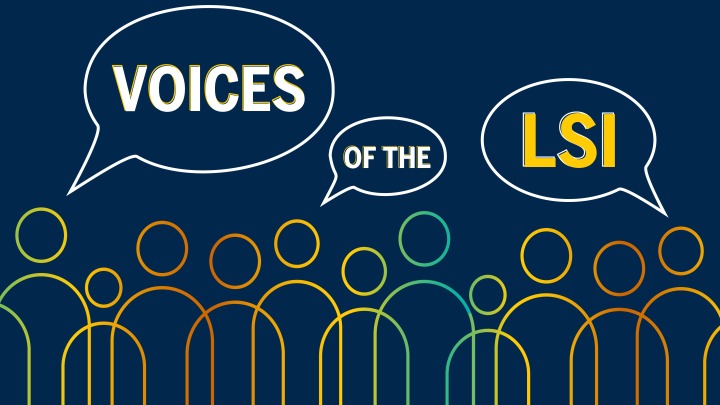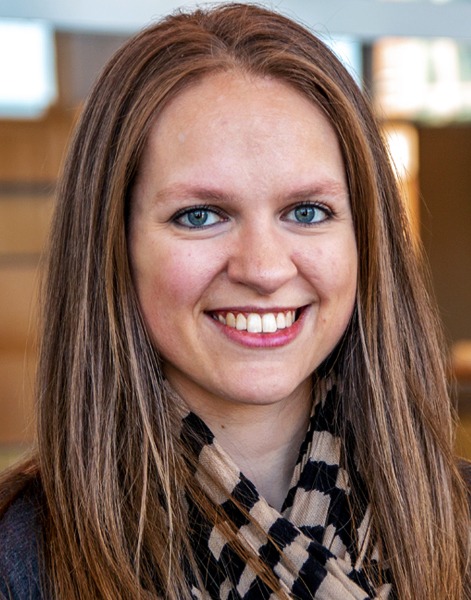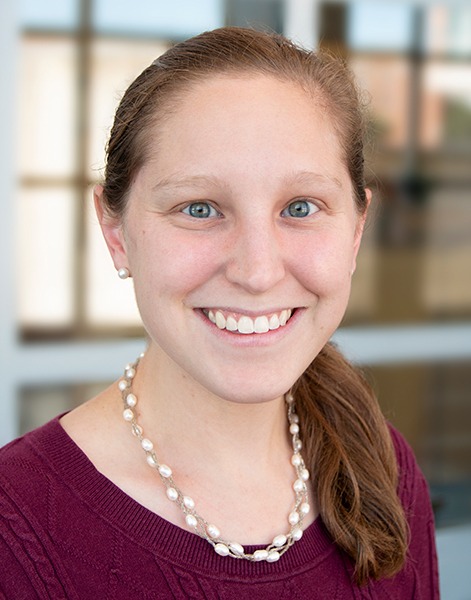
Voices of the LSI: Why we collaborate to build an inclusive academy — Work in action at the LSI
From LSI Director Roger Cone:
It is very simple: We can't become the best that we can be unless we make the LSI a place that is nurturing for the brightest minds from every segment of the population, both here in the U.S. and around the world.
As U-M is coming to the end of its initial five-year strategic DEI plan, we are looking toward how this work will continue to evolve at the LSI. This new quarterly column will feature voices from across the LSI community — including students, trainees, staff, faculty, and leadership — discussing efforts to foster a climate of success at the LSI. Our goal is to provide a comprehensive view of the culture of scientific excellence we are working to create, and why DEI work is essential to achieve this.
I am grateful to our trainees for taking a leading role in this space. Our first edition of the "Voices of the LSI" column features the perspectives of two of these trainees, describing their efforts to foster learning-oriented spaces at the LSI.

From Brittany
I am a first-generation college student, a first-generation career woman and the first in my family to live outside of my hometown in rural America. These are all identities that fiercely challenge the cultural norms of my family and community. Yet, I am here today because of many incredible teachers, mentors, and sponsors; they helped me envision the possibilities, sought out phenomenal opportunities, and ensured I was supported every step of the way. I have immense gratitude for these extraordinary people. I also have a tremendous aspiration to be one of these exceptional educators, which is why I pursued an academic career.
For every one of these amazing individuals, though, there has always been another person boldly challenging my scientific abilities and my place in the academy. I vividly remember when an elite professor told me that I would not be taken seriously unless I lost my southern roots (e.g. accent, slang, cowgirl boots, etc.). Or, when the director of my program gave me a pamphlet on K-12 teaching and said “you don’t have what it takes to get a Ph.D.” It was often in these moments that I considered leaving and finding a career that valued my identities, my beliefs and my fierce ambition.
When I reflect on these experiences, I am always reminded that I hold great privilege in the academy; I am a white cis-gendered woman who grew up in a middle-class family and is a United States citizen. These identities and my position as a future faculty member afford me the platform to question the exclusionary practices of academia and a voice to change them. Combined with my life experiences and my understanding of the impact individuals can have, both affirming and invalidating, I choose to speak up, organize and dedicate time to diversity, equity, inclusion and social justice (DEIJ).
But it is simply not enough to educate and work by myself; it will take a village to transform academia into a space where all are included, are valued and feel a sense of belonging. My identities, experiences and beliefs are why I co-founded the LSI Learning Spaces for Diversity, Equity and Inclusion with Elizabeth — a community dedicated to learning about inequities and implementing inclusive practices. I am incredibly grateful for Elizabeth’s fellowship and unwavering dedication to DEIJ.

From Elizabeth
I hold an immense amount of privilege. I am a straight, white, cis-gendered woman who attended elite private schools from high school through graduate school. In many ways, academia is built for people like me. Yet, I have spent years questioning whether academia actually is a place for me.
For too long, we have upheld a single model of how a “good” scientist looks and acts — a model built on patriarchal norms. In graduate school, I watched the auditorium fill each week for seminars featuring work by male professors, then observed the emptiness of the room when work by female professors was featured instead. I witnessed female faculty role models be disparaged for investing time in teaching, mentorship, and family. I heard a senior male professor claim there were no women in his field worth hiring as faculty. And I witnessed people admire the confidence and assertiveness of my male classmate and positively assess the quality of his science — even when he made scientific claims without showing the data.
When fitting in means upholding a narrow-minded view of what a scientist should be, we exclude those who do not see themselves or their values reflected in academic culture. This exclusion comes at the expense of not only those individuals, but also entire communities whose unique needs and experiences have been overlooked by academic science. Our work is to build an academic culture in which everyone feels respected, valued and capable. Creating an inclusive culture is our responsibility as leaders and as mentors, and is especially the responsibility of those of us who hold privileged identities.
Inclusion does not emerge passively. Rather, it is actively cultivated by a combination of many small, individual acts and thoughtful policy design. It is the way my graduate advisor repeatedly boosted my confidence and told me that I did in fact belong in science. It is the way colleagues like Brittany have opened my eyes to systemic inequities that I did not notice before. It is the way we have re-evaluated how and where we advertise open positions, and what language we use in the job description.
Building inclusion must be proactive, not reactive. It requires buy-in from individuals across the entire academic community, because no one person can make academia inclusive all on their own. Co-founding the LSI Learning Spaces with Brittany gave me the opportunity to bring together a community of people at the LSI who are all dedicated to making science more inclusive. I am so grateful to have found a group that, together, can help make academia a place where all scientists feel like they belong.
Designing spaces for community learning at the LSI
As happened in many communities across the country, protests against police brutality in the aftermath of George Floyd’s murder spurred conversations about systemic racism across the academy and within the LSI. As part of these conversations, we saw a desire to leverage this historic moment to build a more equitable and inclusive LSI. In June of 2020, administrators and trainees alike recognized the power of community learning as a means to broaden our perspectives and provide accountability for growth. Together, we launched a survey to the wider LSI community to gauge interest in book clubs and podcast clubs on the topic of anti-racism. We then started planning our first discussions.
From the start, the Learning Spaces for Diversity, Equity, and Inclusion included people from across the LSI: graduate students, administrators, postdoctoral fellows, faculty, and — crucially — leadership. We intentionally chose this structure to leverage the power of our diverse life experiences. Because race can be a sensitive topic, our DEI Lead Natalie Bartolacci assembled a set of discussion guidelines to set the tone for our group. These guidelines are grounded in the idea that we come together for the purpose of dialogue, with the expectation that we may disagree but are ultimately united in our desire to learn and grow. Critically, we honor confidentiality and recognize that none of us are experts on the topic of race. This environment of trust and respect, together with our commitment to providing phenomenal resources to guide our discussions, fueled our grassroots effort to build a committed community of learners at the LSI.
As key members of LSI leadership and faculty voiced their support for our efforts, we watched the group grow further; over 50 people have participated in our discussions to date. Currently, the LSI community gathers twice a month on Zoom for the Learning Spaces. The conversations are centered around books, podcasts, documentaries and articles that address the roots of racism, the impact of systemic racism today and/or anti-racist actions. Each learning space is led jointly by a trainee and a faculty or staff member, an intentional practice to dismantle power structures and build community across groups in the LSI. Members from across the LSI have stepped up to facilitate discussions, bringing with them new resources and new ideas for how to lead. Facilitators write and share discussion questions that focus on self reflection and include additional resources for further exploration.
To date, the LSI has hosted eighteen community-wide learning spaces. This summer, we are pausing our traditional structure to launch the 2021 LSI Summer Inclusion Challenge. We are challenging every group in the LSI to hold two one-hour conversations: one centered on answering the question, “What is inclusion?”; and one focused on brainstorming group-level policies to promote inclusion. We hope these conversations lead to changes in practices and policies, expand our learning space community and establish even more momentum for building an inclusive environment in the LSI.
While the original impetus for the Learning Spaces was a heightened focus on anti-Black racism, we recognize that building an inclusive LSI will require us to expand both our topics and our infrastructure. In our next chapter, we will broaden our focus to include dismantling other forms of discrimination in the academy based on, for example, gender identity, ability status and socioeconomic status. We also plan to host joint learning spaces with other departments. Finally, we will further formalize our infrastructure to ensure continuity of the Learning Spaces once we leave, and we will continue to more directly advocate for DEIJ to be ingrained into the excellence framework of the LSI. This work is not in addition to our work as scientists. Rather, building a more inclusive LSI is integral to our scientific excellence.
We have already seen the ripple effects of our Learning Spaces: DEIJ work has been integrated as a standard topic in daily conversations and meetings, and the LSI has been more fervently re-examining policies and procedures through a DEIJ lens. With our planned expansions, we hope the number of inclusive policies and procedures continues to grow exponentially in LSI labs, administrative groups and leadership. Building this into our work culture is a necessary step towards ensuring that all members recognize DEIJ as a central value at the LSI.
The Learning Spaces for Diversity, Equity, and Inclusion launched a newfound urgency to create more inclusive practices and procedures at the LSI. While discussion and learning are only the first steps in a long-term process towards building an inclusive academy, we have seen the power of community learning in spurring change. Our hope is that other departments both within and beyond the University of Michigan will use the Learning Spaces as a framework to spark positive change in their communities as well. It will take all of us to build an inclusive academy: a world where everyone can be a scientific leader, be their authentic selves, and be equitably respected and valued.


